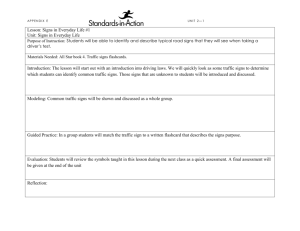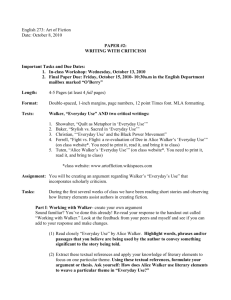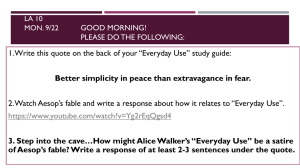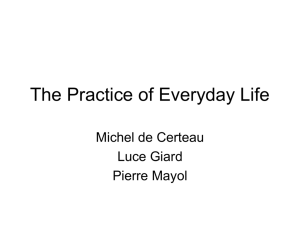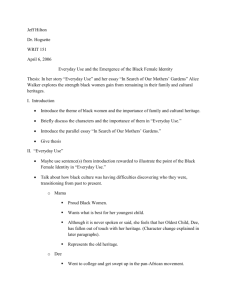2.18
advertisement
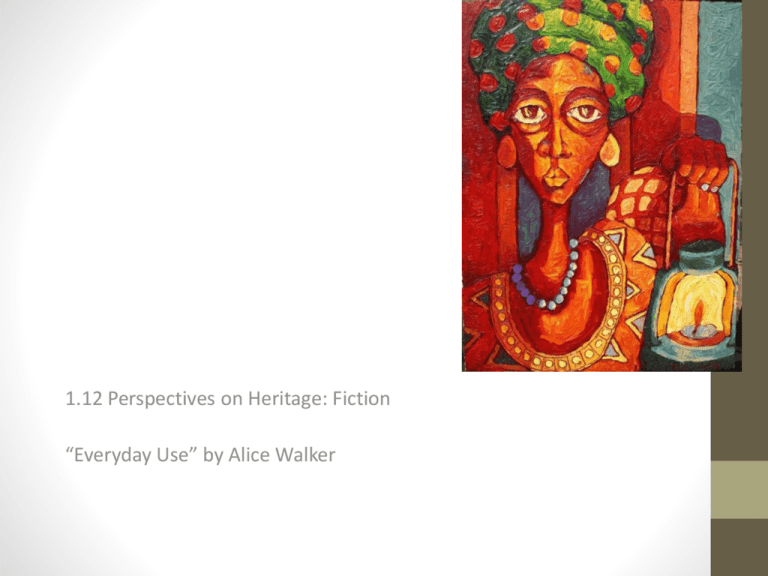
1.12 Perspectives on Heritage: Fiction “Everyday Use” by Alice Walker Analyze a work of fiction to determine and explain the theme of the work Compare and contrast how two different authors explore similar subjects and themes OBJECTIVES Family/ Identity • What are some of the different personalities present in your house? • How are some family members different from others? • How are they alike? • Have you ever disapproved of how your parents live? Do you know grown children who disapprove of their parents? • How do parents handle that situation? • RESPOND IN Quickwrites Alice Walker: “Everyday Use” • • • • Born in 1944 • Video From Eatonton, Georgia Parents were sharecroppers 8 years old when the Supreme Court ruled “Separate but Equal” was unconstitutional • In college during Civil Rights Movement • “Everyday Use” Setting: Rural South Alice Walker: “Everyday Use” (58) • Step One: MARK THE TEXT!! Individually Group 1: Austin, Ryan, Nicole Group 2: Group 3: Ashley, Emily, Julia, Kelsee, Sydnie Emma Group 4: Lauren, Jack, Lauren Group 5: Dane, Zack, Sabrina, Lexi Group 6: Kyle, Olivia, Jay, Mary Grace Group 8: Bianca, Alex, Kayla Period 2 Group 7: Rachel, Shirlyn, Katy Alice Walker: “Everyday Use” Audio • Step One: MARK THE TEXT!! Individually 2) Jon, Leah, 3) Jacob, 4) Alyssa, • SIFT: 1) Aydan, Drew, Michael Kasia, Amanda Frank, Lauren C., Courtney 5) Tyler, 6) Duncan, 7) Kegan, Lauren F., Camila, Austin Athena, Austin J., Luke M., Kaden Robert, Aubrey Period 6 Nick, Ashley, Haylie 8) Amber, Miranda, Lauren W., Compare/ Contrast: With a partner • “My Mother Pieced Quilts” and “Everyday Use” Questions to consider on your Venn Diagram: • What are the characters’ feelings about their cultural heritage? • What do those attitudes reveal about the characters? About what one’s cultural heritage actually means? • Explain the role of education in the lives of the characters. • How might each character be considered a symbol? • What is the significance of the title? How does it relate to theme? Claims & Counterclaims Example claim: In Harper Lee’s novel To Kill a Mockingbird, most of the characters in the novel are afflicted with Maycomb’s usual disease, racism, showing that culture strongly influences a person’s views on what is right and wrong with the world. Example counterclaim: While racism may be widespread, Scout’s character shows that a person’s family more strongly influences a person’s views of others than the broader culture does. YOUR TURN! (BELLRINGER) Claim: In “Everyday Use,” the character Dee does not truly appreciate her heritage but creates a connection to an imagined ancestry. OR Claim: In “Everyday Use” the mother is intimidated by her daughter Dee. Counterclaim: _______________________________________

